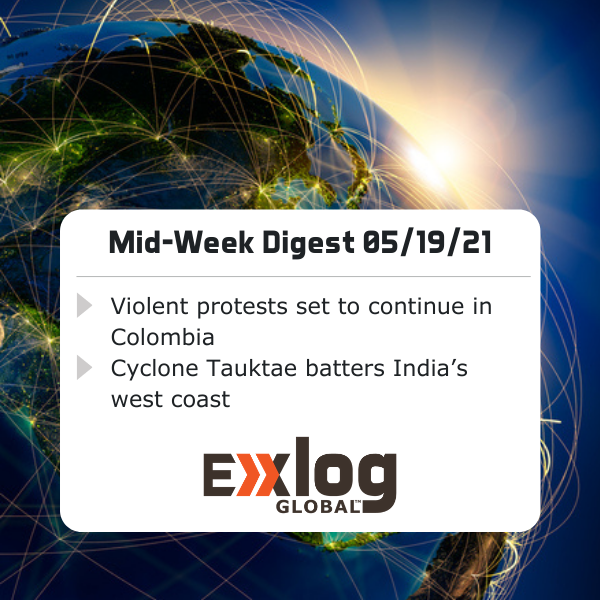Colombia: Ongoing violent protests put pressure on country’s declining economy
Following the proposal of unpopular tax reforms, protracted, violent unrest has engulfed Colombia over the past three weeks, accelerating the economic decline caused by the COVID-19 pandemic. Against the backdrop of the country’s rapidly contracting economy, a growing deficit, and rising unemployment rate (17%), Duque introduced a series of now-defunct tax reforms which were received negatively by trade unions due to their perceived negative impact on the lower- and middle-class. Tens of thousands subsequently took to the streets, leading to violent clashes with the National Police, and Duque’s withdrawal of the tax plan.
Human rights groups estimate there have been at least 48 fatalities, though the government claims only 14 have died as a direct result of the demonstrations. Despite the government withdrawing the tax plan, the protests gained further traction as students joined the ranks – outraged over reports of police brutality, excessive use of force, and sexual abuse against protesters. Student protests—especially in Cali and Bogota—have led to vandalized property, looting, and roadblocks, which have delayed the delivery of essential resources across the country—including 700,000 tons of food and COVID-19 vaccine shipments—resulting in an estimated $1.6 billion USD in general profit loss. Additionally, the array of involved groups has drastically shifted opposition demands, now consisting of universal basic income, free university tuition, and police reform.
The government has accused right-wing militants of infiltrating the demonstrations to incite chaos, while also expressing concerns of a spike in COVID-19 cases as the country continues to deal with its recent wave of infection. Government reconciliation talks have been ineffective, suggesting Colombia’s security and economic situation are likely to continue declining until the government can negotiate an agreement with opposition groups.
India: Cyclone Tauktae makes landfall in Gujarat state exacerbating effects of the ongoing COVID-19 crisis
Tropical Cyclone Tauktae made landfall May 17 IST in western India’s Gujarat state, bringing widespread destruction and exacerbating the region’s ongoing COVID-19 crisis. Tauktae made landfall between the state’s southern cities of Porbanadar and Mahuva, located approximately 160mi (257km) northwest of Mumbai. With sustained winds of up to 125 mph (201 kph)—equivalent to a Category 3 Hurricane—Tauktae tied for the strongest cyclone to ever make landfall in Gujarat. So far, the storm has resulted in at least 46 fatalities across several states, including Gujarat, Maharashtra, Kerala, Karnataka, and Goa.
Over 50 National Disaster Response Force teams were deployed to Gujarat state ahead of the storm to evacuate an estimated 200,000 individuals and ensure the continued operation of COVID-19 hospitals and treatment centers in the area. Vaccination campaigns were temporarily suspended in Gujarat and Mumbai in the face of the impending storm; Mumbai has resumed their vaccination campaign as of May 18 while Gujarat is expected to resume theirs May 20. As of May 18, power had been restored to 29 of Gujarat’s 81 COVID-19 hospitals, 12 of 16 regular hospitals, and 6 of 19 oxygen refilling plants; the impact of the power outages greatly exacerbating the ongoing hospital bed and oxygen shortages throughout the region.
Additionally, the Indian Navy mounted search and rescue operations when a barge carrying 261 passengers sank after strong winds broke it free from an oil rig; approximately 185 have since been rescued, 26 confirmed dead, and 50 remain lost at sea. This was the only report of damage or disruption to India’s oil companies operating in the region, though officials reported damage to several ports. Despite ongoing response and recovery efforts, the effects of Tauktae are expected to further hinder India’s ability to effectively confront its second COVID-19 wave in the near term.


